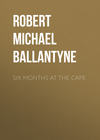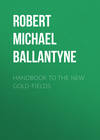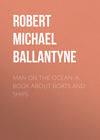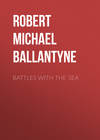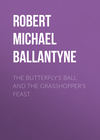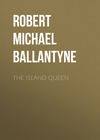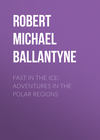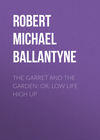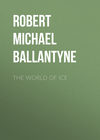Читать книгу: «Six Months at the Cape», страница 2
Another curious effect, and rather absurd mistake, resulted from the different densities in the super-heated atmosphere which caused this mirage. Fancying that I saw two springboks on the horizon I pointed them out to my boy.
“Ja!” said Mike, nodding his head and riding towards them at a smart canter. As we advanced I observed that the boks began to grow rather larger than life, and that Mike slackened his pace and began to grin. It turned out that the objects were two carts with white canvas hoods, and when we came up to them we found they belonged to a party who had come out to join us, but who, up to that hour, had been unable to discover us in the vast hunting-field!
After directing them to our camp we proceeded on our way. That is to say Mike did. For myself, I was completely lost, and if left to myself should have been quite unable to return to camp.
While galloping along, revelling in the sunshine—in the love of which I will not yield to cats—we came suddenly on the largest snake I had yet seen. It was, I believe, a cobra, must have been fully six feet long, if not more, and was gliding with an easy sinuous motion over the plain as fast apparently, as a man’s ordinary running-pace. I observed that it did not get out of the way of small bushes, but went straight through them without the smallest check to its speed. It suddenly dived into a hole and disappeared. It is said that when snakes take to a hole to escape pursuit, some of them have a habit of causing their heads to stop abruptly at the entrance, and allowing their bodies and tails to flip past like the lash of a whip, so that if the pursuer were to thrust in his hand to grasp the tail he would be met by the fangs! As the bite of most South African snakes means death, if the part be not cut out, or otherwise effectually treated, handling them is carefully avoided. Nevertheless my friend Jonathan—when a younger man, let us hope!—was in the habit of occasionally catching deadly snakes by the tail, swinging them round his head, and dashing out their brains on a stone or tree!
Soon we perceived two of our comrades driving a flock of springboks towards the river. Mike at once diverged towards a clump of bushes which it seemed probable they would pass. In ten minutes we were down in a hollow, with the horses hid behind a mimosa-thorn. The boks had not seen us, being too much taken up with their pursuers; they came straight towards us.
“Now, sar,” whispered Mike once again, while his eyes glared with glee, “now’s you chance!”
I went down on one knee, carefully sighted the rifle, and looked up. The foremost bok was within good range. I fired and missed! “Desolation!” said I, cramming in another cartridge while the flock diverged to the left.
There was no hope now of anything but a running shot. I aimed carefully. The smoke cleared off, the flock dashed on, but—one bok lay prone upon the earth. Bang! went my second barrel, and another bok, leaping into the air, fell, rose, fell again, then rose and ran on.
Mike was now jubilant. The whole internal structure of his mouth was disclosed to view in his satisfaction, as he viewed the prostrate animal. I may add that although we did not find the wounded bok that evening, we found him next day.
With our prize strapped behind Mike’s saddle we rode in triumph into camp, a little before sunset, and found most of our companions assembled, busy preparing supper and making other arrangements for camping out on the veldt—as they call the plain. Some had been successful, some had failed, but a good many springboks had been killed, and all were hearty as crickets and hungry as hyenas.
To kindle fires, boil tea, roast venison steaks, spread blankets on the ground, and otherwise attend to the duties of the bivouac, was now the order of the hour. The moon rose while we were thus engaged, and mingled her pale light with the ruddy blaze of camp-fires. We spoke little and ate much. Then followed the inevitable pipe and the pleasant chat, but we were all too ready for rest to care about keeping it up long. I was constrained to take the bed of honour in the cart. The others stretched their limbs on the Karroo, and in ten minutes every man was in the land of nod.
Next day we mounted at daybreak and renewed the hunt, but I will say no more about it than that we bagged twenty-six springboks amongst us, and that Six-foot Johnny, having killed the greatest number of animals, returned home “King of the hunt,” with a scrap of ostrich feather in his cap.
Letter 3.
Somerset—The British Settlers—Original “Owners”—Native Church-Going
On my way to the Karroo I had to pass through Somerset East, and it so fell out that I fell in with a countryman from Edinburgh, who chanced to be going to Somerset in the same “passenger-cart” with myself. His name must have been a novelty once, though much of its freshness is worn off now—it was Brown.
Our cart had a hood; the roads were very bad, and the behaviour of that hood was stupendous! Its attachment to the cart was, so to speak, partial; therefore it possessed a semi-independent motion which was perplexing. You could not count on its actions. A sudden lurch of the cart to right or left did, of course, carry the hood with it, and, counting on that, you laid your sudden plans to avoid collision; but the elasticity of the hood enabled it to give you a slap on the face before obeying its proper impulse. So, too, it would come down on your head unexpectedly, or, without the slightest provocation, would hit you on the neck behind. I learned with painful certainty in that cart that I had a “small” to my back! It seemed to me that it grew large before the journey was over.
Brown was an intelligent man,—not an unusual state of things with the “Browns.” He had two pretty daughters with him, aged eight and twelve respectively. We got on well together, and crossed the Zuurberg range in company on the last day of the year.
It was over passes in this range that the settlers of 1820 went in long trains of Cape wagons, with wives and little ones, and household goods, and civilised implements of husbandry, and weapons of defence, with high hopes and strong courage, and with their “lives in their hands,” to subdue the wilderness. It was from these heights that they looked over the beautiful and bush-clad plains of “Albany,” which lay before them as the lot of their inheritance.
The breaking up and scattering of the various “parties” was most eloquently and graphically told by the Reverend H.H. Dugmore in a lecture delivered at Grahamstown, on the occasion of the “British Settlers’ Jubilee,” in May 1870—fifty years after the arrival of the “fathers.”4 I quote one passage, which gives a good idea of the manner in which the land was taken up.
“And now the Sunday’s River is crossed, and the terrible old Ado Hill is climbed, and Quaggas Flat is passed, and the Bushman’s river heights are scaled. The points of divergence are reached, and the long column breaks into divisions. Baillie’s party made their way to the mouth of the Fish River, where, it was said, the ‘Head’ had been allowed to choose a territory, and where he hoped to realise imaginations of commercial wealth by founding a seaport town. And the Duke of Newcastle’s protégés from Nottingham took possession of the beautiful vale of Clumber, naming it in honour of their noble patron. And Wilson’s party settled between the plains of Waay-plaats and the Kowie bush, right across the path of the elephants, some of which they tried to shoot with fowling-pieces. And Sefton’s party founded the village of Salem, the religious importance of which to the early progress of the settlement, is not to be estimated by its present size and population. These four were the large parties. The smaller ones filled up the intervening spaces between them. Behind the thicket-clad sandhills of the Kowie and Green Fountain, and extending over the low plains beyond Bathurst, were the locations of Cock’s, Thornhill’s, Ostler’s, Smith’s, and Richardson’s parties. Skirting the wooded Kloofs from Bathurst towards the banks of the Klienemonden, were ranged the parties of James and Hyman. It was the latter who gravely announced to Captain Trapps, the Bathurst magistrate, the discovery of ‘precious stones’ on his location; and which the angry gentleman, jealous of the reserved rights of Government, found, on further inquiry, were only ‘precious big ones!’ The rich valley of Lushington afforded a resting-place to Dyason’s party. Holder’s people called their location New Bristol; which never, however, acquired any resemblance to Old Bristol. Passing on towards the front, there were Mouncey’s party, Hayhurst’s party, Bradshaw’s party, Southey’s party, stretching along the edge of the wide plains of the Round Hill, and drinking their Western waters. The post of honour and of danger was the line of the Kap River. This was occupied by the party of Scott below Kafir Drift, and by the Irish party above it. The forlorn hope of the entire settlement was Mahony’s party at the clay pits, who had to bear the first brunt of every Kafir depredation in the Lower Albany direction. Names thicken as we proceed from Waay-plaats towards Grahamstown. Passing Greathead’s location, we come among the men of Dalgairns at Blauw Krantz. Then those of Liversage about Manly’s Flats. John Stanley, ‘Head of all Parties,’ as he styled himself, belonged to the same neighbourhood. Turvey’s party were in Grobblaar’s Kloof; William Smith’s at Stony Vale, Dr Clarke’s at Collingham. Howard’s, Morgan’s, and Carlisle’s, bring us by successive steps to the neighbourhood of Grahamstown.
“My ‘reminiscences’ are those of an Albany settler; but I do not forget that there was another party, who, though locally separated from the main body, occupied a position, the importance of which developed itself in the after-history of the settlement. I refer to the Scotch party, who were located on the Baviaans River, among mountains and glens that have been rendered classic by the poetry of their leader and historic by the gallant deeds and endurance of his compatriots in the after-struggles of the frontier. I need make no particular reference, however, to the early circumstances of that body of men, as in Pringle’s African Sketches they have a most graphically-written history of their own.”
Thus, in 1820, was the land overrun and taken possession of by the “British Settlers.” It had once been the land of the Hottentots, but had never at any time rightfully belonged to the Kafirs, who, after wrongfully entering it and rendering themselves by their thievish disposition and deceit an unbearable nuisance, were finally driven out of it in 1819.
The idea of Government in sending the settlers out to occupy these vacated lands was, that a convenient buffer might thus be placed on the frontier of the colony to keep the savages in check. That these settlers and their descendants received many a rude shock, and played their part nobly, has been proved, and is admitted on all hands. That they received less encouragement and help from those who induced them to emigrate than might have been expected, is equally certain.
Brown and I chatted, more or less, of these things as we toiled up the slopes of the Zuurberg, where the original settlers had toiled fifty-five years before us, and in the afternoon came to a pretty good inn, where a small misfortune befell us. While we were indulging in a cup of tea, one of our horses escaped. We had crossed the mountain range by that time, and the truant had a fine range of undulating country to scamper over. That animal gave us some trouble, for, although nearly a dozen men went, after him on horseback, he kept dodging about actively with many flourishes of heels and tail during the whole afternoon.
When one is in no hurry, and the weather is fine, a delay of this kind is rather pleasant than otherwise. While men and boys were engaged in the fruitless chase, I wandered off into the bush in the hope of stumbling on a tortoise or a snake, or some other creature that I had previously been accustomed to see in zoological collections, but the reptiles kept close, and refused to show themselves. I came, however, on a gigantic beehive; at least it resembled one in appearance, though the smoke that issued from a hole in its top suggested humanity. There was also a hole in one side partially covered by a rickety door. Close beside it stood a little black creature which resembled a fat and hairless monkey. It might have been a baboon. The astonished gaze and grin with which it greeted me warranted such an assumption, but when it suddenly turned and bolted through the hole into the beehive, I observed that it had no tail—not even a vestige of such a creation,—and thus discovered that it was a “Tottie,” or Hottentot boy. The sublime, the quaint, the miserable, the ridiculous, and the beautiful, were before me in that scene. Let me expound these five “heads” in order.
On my left rose the woody slopes and crags of the Zuurberg, above whose summits the white hills and towers and gorgeous battlements of cloud-land rose into the bright blue sky. Around me were groups of flowering mimosa bushes, with thorns from three to six inches long, interspersed with which were curious aloes, whose weird leafy tops gave them the aspect of shrubs growing upside down with their roots scrambling aimlessly in the air. In front stood the native hut, the wretchedness of whose outside was only equalled by the filth and poverty-stricken aspect within. Near to this were several native children, as black as coal, as impudent-looking as tom-tits, and as lively as crickets. Beyond all lay the undulating plains studded with flowering shrubs of varied form and hue, and bathed in golden sunshine.
There is something sad, ay, and something mysterious, to me in the thought that such a lovely land had been, until so recently, the home of the savage and the scene of his wicked and ruthless deeds.
On New Year’s day I dined in a public restaurant in Somerset,—in a strange land with strangers. But the strangers were not shy. Neither was I. There were about a dozen of us at table, and before dinner was half over we were as sociable as if we had been bosom friends from infancy. We even got to the length of warm discussion, and I heard some sentiments expressed regarding natives and “native policy,” with which I could not agree; but, being ignorant on the subject at the time, I stuck to general principles. It seemed to me that some of the speakers must have been born with their brains turned the wrong way. This idea recalls to memory the curious fact that, during my first walk in Somerset, I saw a mounted Hottentot policeman wearing his helmet with the fore part to the back, because its rear peak was longer, and a better sunshade, than the front.
The same tendency to sacrifice appearance to utility is observable among the Malays of Capetown, who treat their sou’-westers similarly.
My first visit to a native church was on a Sunday,—the hottest Sunday I ever spent. The congregation was entirely black and brown. It, also, was hot, so that the church was by no means cool. Whatever depth, or want of depth, there might have been in the Christianity of these people, the garb and the bearing of civilisation were very obvious and very pleasant to behold. Their behaviour was most orderly and modest, though, probably, many of them had gone there to display their finery.
Taking my place near the pulpit I saw them to advantage. The church was pretty full. I sat down beside a very stout Hottentot girl, whose dress of showy chintz was as much a subject of interest to herself as of indifference to the congregation. There were marvellous contrasts and surprising harmonies displayed in that church, with not a few discords. Childlike good-humour sat on every countenance. When Mr Green ascended the pulpit eager expectancy gleamed in every jet-black eye. When the psalm was given out the preparatory clearing of throats and consequent opening of thick red lips and revelation of splendid rows of teeth all over the church had quite a lighting-up effect on the scene. They sang heartily and well of course,—all black people do so, I think. Just opposite me sat a young man with a countenance so solemn that I felt sure he had made up his mind to “be good,” and get the full benefit of the services. His black cheeks seemed to glisten with earnestness; his thick lips pouted with devotional good-will. I do not write in ridicule, but merely endeavour to convey my full meaning. He wore a superfine black dress coat, a gaudy vest, and buff corduroy trousers so short that they displayed to advantage his enormous bare feet. Beside him was an elderly man with tweed trousers, a white shirt and brown shooting coat, and a face not quite so solemn but very sedate. Some of the men had boots, some had black silk hats, others wideawakes,—which of course they removed on entering. It seemed to me that there was among them every part and variety of costume from morning to evening dress, but no individual could boast of being complete in himself.
As for the women, they were indescribable. Some of them wore little more than a blanket, others were clothed in the height of European fashion,—or something like it,—and all had evidently put on their “Sunday’s best.” One stout and remarkably healthy young woman appeared in a brilliant skirt, and an indescribable hat with ostrich feathers on her woolly head. She sat herself down close beside me and went to sleep at the beginning of the sermon—not out of irreverence, I am persuaded, but from heat. In this state she continued swaying to and fro to the end of the discourse, occasionally drooping, as though she meant to make a pillow of my shoulder, which she would certainly have done, but for a more modestly clad Hottentot girl at her other side, who, evidently scandalised, kept poking at her continuously with her elbow. In justice to the congregation I am bound to add, that I saw very few sleepers. They were most attentive and earnest, despite the distracting elements of a humorous kind that obtruded themselves.
Somerset East is a pretty town on the Little Fish River, at the foot of the Boschberg mountains, which rise abruptly from the plain. It boasts of banks, a newspaper, several churches, and the Gill College,—an imposing edifice which was erected by private endowment. In regard to its inhabitants, all I can say is, that the few members I had the pleasure of meeting there during a three days’ sojourn were exceedingly hospitable and kind.
Letter 4.
Adventures with Ostriches
Ostrich-farming is no child’s play. It involves risk in more ways than one, and sometimes taxes both the courage and strength of the farmer.
In ordinary circumstances the ostrich is a mild, inoffensive creature—indeed the female is always so; but when a male ostrich is what I may style nesting—when, enclosed in a large field or paddock, he guards his wives and his eggs—no lion of the desert, no tiger of the jungle or kloof, is more ferocious or more savagely bent on the death of any or all who dare to intrude on his domain.
The power of the ostrich, too, is quite equal to his strength of will. He stands from seven to nine feet in height, and is very heavy.
His tremendous legs are his only weapons, and his kick is almost, if not quite, equal to that of a horse. Possessing enormous feet, with two toes on each, the horny points of which can cut and rip like cold chisels, he rushes at an adversary and kicks, or hits out, straightforward, like a prize-fighter. No unarmed man on earth could stand long before a furious male ostrich without being killed. But there are one or two weak points about him, which abate somewhat the danger of his attack. In the first place his power lies only in his mighty legs, the thighs of which—blue-grey and destitute of feathers—are like two shoulders of mutton. With his beak he can do nothing, and his long neck is so weak that if you can only lay hold of it and pull his head to the ground you are comparatively safe, for he cannot kick effectively in that position, and devotes all his energies, when thus caught, to useless attempts to pull his head out of your grasp. But, then, how are you to get hold of that neck—the root of which stands nearly as high as your own head—in the face of two claws that go like battering-rams wrought by lightning? As well might you attempt to lay hold of a prize-fighter’s nose while his active fists are darting out at you.
A powerful, active man has been known, when attacked while unarmed, to spring on the bird, grasp a wing with one arm and the body with the other, and hug it, but there is great danger in this method, because in the attempt you are pretty sure to receive at least one kick, and that, if it takes effect, will be quite sufficient to put you out of action. It also requires much power of endurance, for, hugging a creature that is strong enough to dance about and lift you off your legs in its wild efforts to get rid of you, must be hard work. Supposing that you do succeed, however, in holding on until you work your way along to the neck and get the head into custody, then you can without much difficulty choke the bird, but a male ostrich costs about 150 pounds, and one hesitates to choke 150 pounds, even for the sake of one’s life, especially when the valuable bird belongs to one’s friend.
Another and perhaps the best plan, if you are caught unarmed, is to lie down. An ostrich cannot kick you when you lie flat on the ground, he can only dance on you, and although that process is unpleasant it is not necessarily fatal.
The ostrich is easily killed by a blow on the neck with a stout stick, but this is as objectionable as the choking process, on the ground of cost. In short, the only legitimate method of meeting a savage papa, in his own field, is with a strong forked pole eight or nine feet long, with which you catch the bird at the root of the neck, and thus keeping him at pole’s-length, let him kick and hiss away to his heart’s content till he is tired, or until assistance comes to you, or until you work him near a wall, when you may jump over and escape, for an ostrich will not jump.
Often have I gone, thus armed, with my friend Hobson to feed the nesting ostriches. The risk of attack, I may mention in passing, is not great when two men go together, because the bird seems undecided which foe to attack, and generally ends by condescending to pick at the mealies, (Indian corn), which are thrown down to him.
One morning Hobson and his eldest son Six-foot Johnny and I mounted our steeds and rode away to the field in which one of the male ostriches dwelt with his meek brown wives. The wives are always brown, the husbands are jet-black, with the exception of those magnificent and pure white feathers in wings and tail which are so much prized and worn by the fair dames of Europe. Hobson carried a sack of mealies at his saddle-bow.
There were several male birds on the farm, all of which were distinguished by name. There were “Master,” and “David Marais,” and “Black Jack,” and “Blind-boy,” (minus one eye!) and “Gouws,” etcetera. Our visit that morning was to David Marais. David was by far the fiercest of the lot, but he was excessively fond of mealies, and could be attracted—though by no means appeased—by these.
“Johnny,” said Hobson, as we cantered along by the side of the little stream which caused a strip of bright fertility to wind like a green-snake over the brown Karroo, and which was, as it were, the life-blood of the farm, “Johnny, I want you to go to the nest and count the eggs, while I keep David in play.”
“Very well, father.”
The order, and the quiet acceptance of it, did not seem to involve much, yet Johnny had been ordered on somewhat dangerous service that morning, for David Marais was intensely watchful as well as savage. Several of the other males, although capable of giving way to temper, were so far amiable that my friend and I had frequently gone into their enclosures with our forked sticks and mealies, and had received no worse at their hands than a threatening attitude or a suspicious look, which passed away when the food was thrown down; but David’s temper was such that we never ventured into his paddock, contenting ourselves by throwing the mealies over the hedge or wall that bounded the field. This field, or enclosure, by the way, was not a small piece of ground which one could take in at a glance. It was more than a mile in extent, undulating in form, with a stream bisecting it, and mimosa bushes scattered here and there, so that from any one point you could not see the entire field, or ascertain its exact form or size. Sometimes, on going into such a field, one has to look about for the birds—also to “look out” for them, as they are prone to sudden assault!
But David Marais required no looking for. His large eagle-eye had detected us from afar, and we found him at the nearest extremity of the nearest angle of his grounds ready to give us battle, pacing slowly to and fro, with that peculiar motion of the wings which indicates suppressed wrath.
We rode along close to his hedge a short distance, and he marched with us, brushing against the hedge and showing an anxious desire to get at us. If there had been a gap in that hedge he would have charged like a thunderbolt, but there was no gap, and it is a strange fact that an ostrich cannot leap—at least he will not. The merest trifle of an obstruction—a bit of wall or hedge over which he could step with perfect ease—is sufficient to check his advance and keep him in; that is, if he walks up to it, but he is a stupid bird, and if he runs up to such an obstruction he may tumble over it, gather himself up on the other side, and so continue the charge.
On reaching a part of the hedge which dipped into a hollow, Hobson dismounted and opened the sack with the peace-offering. The bird, after breasting up to the hedge and finding it impassable, sat down on what may be styled his elbows, scraped his wings on the ground, and rolled his head and neck about in a fashion that is indescribable. This, I was told, was his method of rousing himself, or of relieving his feelings. It looked more like making a fool of himself. A handful of mealies seemed to irritate him at first, but by degrees the temptation became too strong. He commenced to pick a few seeds—ready, however, on the smallest provocation, to forsake them, charge up to the hedge, and hiss at us.
“Now, Johnny, I’ll keep him in play,” said Hobson senior. “You go round to the nest. Keep well down in the hollows, else he’ll be sure to see you.”
Johnny at once rode off. The suspicious David looked after him and showed a tendency to retire in the direction of his nest, but Hobson raised his forked stick over the hedge and made a demonstration therewith. This was more than enough.
Inflated with rage David at once accepted the challenge, and rushed back to the hedge, over which another handful of mealies were thrown at him, but mealies had lost much of their power by that time. Thus, with alternate taunt and temptation was the false attack maintained by the father, while the real attack was made by the son, at the other extremity of the fortress.
I followed the real attack. We did not go direct. The bird would at once have made for its nest had we done so. We rode off in the direction in which we had come until out of sight, and then, making a long circuit at full gallop, came round to the other end of the enclosure, from which point the enemy could not be seen.
There was a wall to cross, then a deep hollow through which the little stream ran, then a belt of pretty thick bushes, beyond which, on the open plain, the nest was known to lie—if I may call that a nest which is a mere hollow in the sand, in which the eggs are laid. Here the female sits all day while the male marches about on guard. At night the male sits while the female goes about and feeds. They are most attentive parents, and there is a fitness in this arrangement as regards colour, for the brown female squatted on the brown Karroo is almost invisible in daylight, while the black male is equally invisible during the darkness of the night.
“You mustn’t come with me,” said Johnny, dismounting; “it would only increase the chance of my being seen by David.”
I was detailed, therefore, to the inglorious duty of holding the horses, while my young friend made the assault alone.
He leaped the wall, descended into the bed of the stream, scrambled up the opposite bank, crossed the clump of small wood, and came out into the open. Now a short piece of this open—fifty yards or so, perhaps—was visible from the lower end of the field, where Hobson and David were still coquetting with each other. Johnny tried to skulk over this open ground. He might as well have sought to evade the eyes of Argus. The long-sighted bird caught the very first glint of his cap. Insult and mealies were alike unavailing now. He forsook the sire and made at the son with his great compass-like legs, covering the ground in tremendous as well as rapid strides. No race-horse ever cleared the ground like David Marais! Johnny saw that the “game was up.” Applying his own long legs to the ground with a will, he rushed at the nest. The female bounced up, ran a few yards, and squatted in helpless stupidity. Johnny counted the eggs, turned, and fled. Not a moment too soon! Indeed he was too late, for the ostrich was already close up, and Johnny’s retreat by the way he had come was cut off; but he turned at a sharp angle, and made for another clump of bushes, through which he plunged with a wild hilarious laugh, into the safe retreat of the river-bed. David Marais could not follow there, but he doubtless consoled himself with the reflection that he had gallantly defended his wife and little ones, and had beaten the enemy from the field!
Nothing of all this had I seen, for the belt of bushes hid the actors from view, but I heard the ringing laugh with rather anxious surprise, and saw Johnny emerge immediately after from the banks of the stream, flushed and panting from his adventure.
Покупайте книги и получайте бонусы в Литрес, Читай-городе и Буквоеде.
Участвовать в бонусной программе
